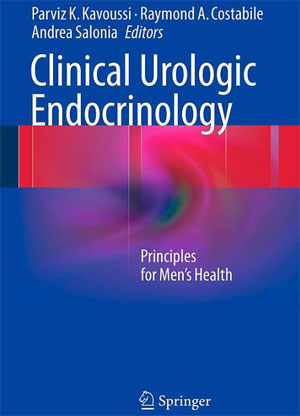Low Testosterone
At Austin Center for Men’s Health we offer an individualized evaluation and treatment for men with low testosterone (Low T). Our low testosterone Austin specialist is Dr. Parviz Kavoussi, a leading, respected and pre-eminent expert on diagnosing and managing low T and our Austin office is only one of a handful of expert centers in the entire Unites States. Our Austin low testosterone patients can expect individualized and private consultations and treatments with Dr. Kavoussi personally. The award-winning and Fellowship-trained specialist in Austin, Dr. Kavoussi has provided countless successful treatments to local Austin low testosterone patients and beyond. In addition to having compiled and served as the editor-in-chief of the first textbook (“Clinical Urologic Endocrinology: Principle’s for Men’s Health”) of its kind with a focus on low testosterone and other hormonal issues in men, Dr. Kavoussi also sits on regional and national committees, provides peer review for scientific journals and is frequently interviewed by Fox News, CBS, ABC & NBC.
Schedule a Private Consultation with one of our low testosterone specialists today! Call 512-444-1414 or request an appointment online.
Frequently asked questions:
What is low testosterone?
Low testosterone, also known as hypogonadism or low T, refers to reduced or absent production of the hormone testosterone, by male testicles.
How common is low testosterone?
Approximately thirteen million men are diagnosed with low t levels in the US each year. Keep in mind that these are only the men who are coming forward and being diagnosed. From the third decade of life and on, men can experience a loss of between one to two percent of their testosterone yearly, resulting in an estimated 30% of men in their 50’s and 60% of men in their 60’s suffering from low T. Low testosterone can certainly affect men in younger age groups as well.
What are the common signs and symptoms of low testosterone?

- Decreased energy and increased fatigue
- Worsened erectile function
- Reduced sex drive
- Depressed mood
- Tiredness
- Are you having decreased motivation?
- Disturbed sleep
- Worsened spatial cognition
- Hot flashes
- Infertility
- Increased fat mass
- Decreased muscle mass
- Decreased bone mineral density (osteoporosis)
- Worsened cholesterol levels
- Deterioration of skin and hair
- Decreased strength and endurance
- Difficulty concentrating and focusing
What conditions increase the risk for low testosterone?
Conditions that increase the risk for low testosterone include chronic opioid narcotic use, obesity, diabetes, AIDS, high blood pressure, high cholesterol, and erectile dysfunction.
How is a man diagnosed with low testosterone?
Low testosterone is a clinical diagnosis based on the man’s signs and symptoms and physical examination. Laboratory studies including two blood tests measuring testosterone should be performed on separate days to confirm the diagnosis of low testosterone. The blood should be drawn between 7 and 11 in the morning, as that is the time frame within a 24 hour time period when testosterone levels are the highest.
What are the benefits of treatment to get the testosterone level back up into a normal range?
After careful evaluation of each individual, men who are candidates for therapy can be treated to increase the testosterone level back within a normal range, to help enhance their quality of living by increasing strength and bone mineral density, and improving body composition, cholesterol parameters, sexual desire, and erectile function; and improving overall energy levels and decreasing fatigue.
Will testosterone replacement restore erectile function in men with erectile dysfunction?
Many times, ED is due to more than just a single cause. In some men, normalizing the testosterone level may be all that is needed for a satisfactory improvement in erections. In others, it may not; however; men who have a normalized testosterone level have better responses to oral medications for ED such as Viagra, Levitra, and Cialis.
What are the treatment options for testosterone replacement therapy?
- Oral medications
Pills are not given for testosterone replacement as they have been shown to have dangerous side effects on the liver.
- Testosterone patches
Testosterone patches may be used to deliver testosterone through the skin and the patches are typically changed out daily. It is not uncommon to see skin reactions to the patches.
- Testosterone gels
There are a number of transdermal testosterone gels which are applied to clean, dry skin for absorption through the skin. Gels have to be applied daily and men who use gels must be cautious about transferring testosterone to women or children with skin to skin contact. Gels offer a non-invasive treatment option that keeps the testosterone consistently normalized.
- Testosterone injection therapy
Testosterone can be replaced by using injection therapy directly into the muscle. The typical regimen requires an injection every week or every other week. Some disadvantages of injections are that there can be a roller coaster effect, where the testosterone level peaks with an injection, and may even go above the normal range, and then drops down prior to the next one. Low T symptoms can roller coaster along with these levels. Although a regimen is used to minimize these peaks and troughs, it is very difficult to dose without having these ups and downs. Injections also carry the highest incidence of the side effect of elevating the hemoglobin and hematocrit (the red blood cell mass within the blood vessels), which may have a dangerous effect.
What do varicoceles have to do with low testosterone?
A varicocele is an abnormal dilation of veins around the testicle. It has been well established that varicoceles can adversely impact a man’s fertility. Recently there have been studies showing that men with varicoceles have lower testosterone levels overall than men without varicoceles, and that when the varicoceles are repaired surgically, 70% of the time the testosterone level will rise by an average of 178 ng/dl. This can potentially keep men off of medical treatment for low testosterone or possibly delay the time until medical treatment would be required.
Who should not be treated with testosterone replacement therapy?
Men with known or suspected active breast or prostate cancer. Men who are interested in maintaining their fertility potential. Other medications can be used to treat men who want to maintain fertility potential and have low testosterone which will not have an adverse impact on fertility.
Could you have low testosterone?
If you answer yes to the following questions, it is worth checking!
Are you experiencing a reduced libido / sex drive?
Are you lacking energy?
Have you experienced a decrease in strength and / or endurance?
Have you experienced a loss in height?
Are you experiencing less enjoyment in life?
Do you feel grumpy or sad?
Do you experience weaker erections?
Has your ability to play sports diminished?
Do you fall asleep after dinner?
Has your work performance deteriorated?
Are you having sleep disturbances?
Are you having difficulty concentrating and focusing?
Are you having hot flashes?
Are you having difficulty maintaining muscle mass and losing fat mass?
Are you having decreased exercise tolerance and motivation?
Are you getting agitated and irritated more easily?
What are patients saying about their experience with management of low testosterone at Austin Center for Men’s Health?
“I was referred to Dr. Kavoussi by my family doctor after weekly injections failed to increase my testosterone to acceptable levels. Dr. Kavoussi took the time to thoroughly explain all the treatments that he offered. In the end, I decided to go with the time release pellets. I just had my second treatment and the procedure is quick and causes very little pain. Just a small shot to numb the insertion area. The staff is helpful and friendly and I have yet to wait more than 5 minutes to see the doctor once I check in with the front desk. I highly recommend Dr. Kavoussi.”
“Low testosterone and the archaic forms of application are what led me to Dr. Kavoussi. Instead of daily applications, I’m on a 3-6 month schedule using implanted time release pellets. The office staff has been very helpful. I strongly recommend Dr. Kavoussi and the clinic.”
Schedule a Private Consultation in one of our low testosterone Austin offices now! Call 512-444-1414 or request an appointment online.


